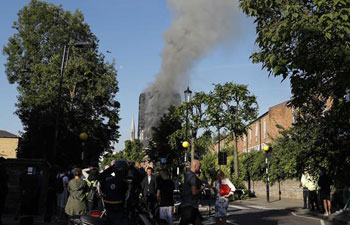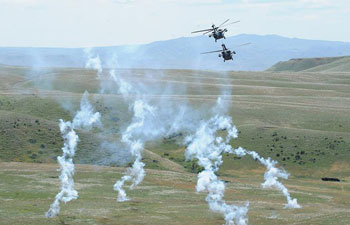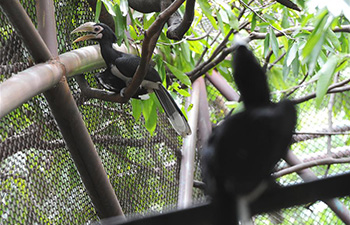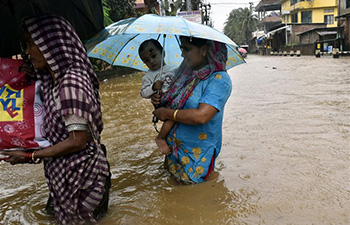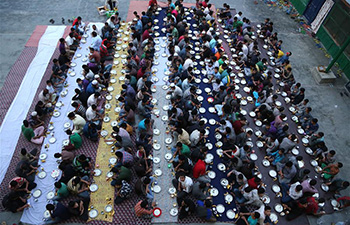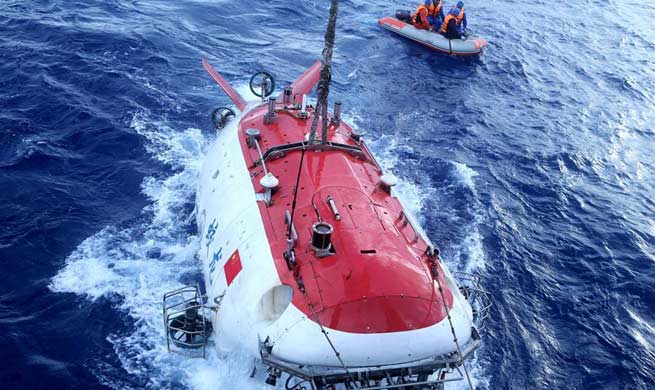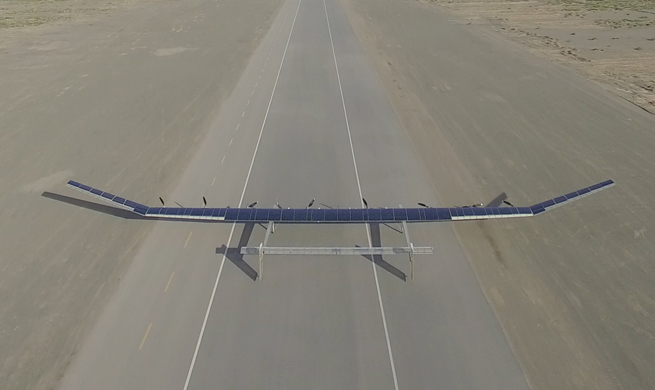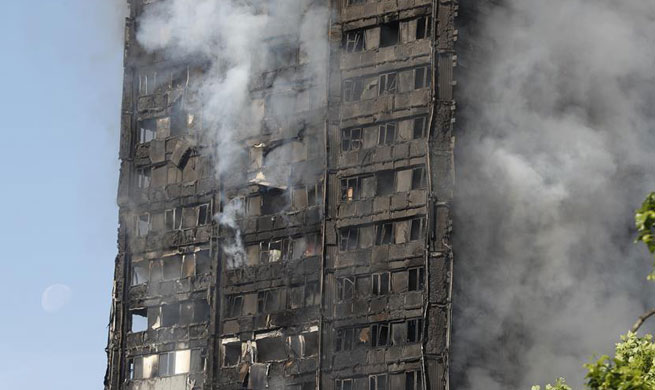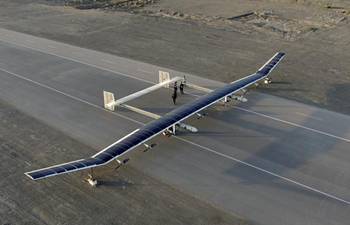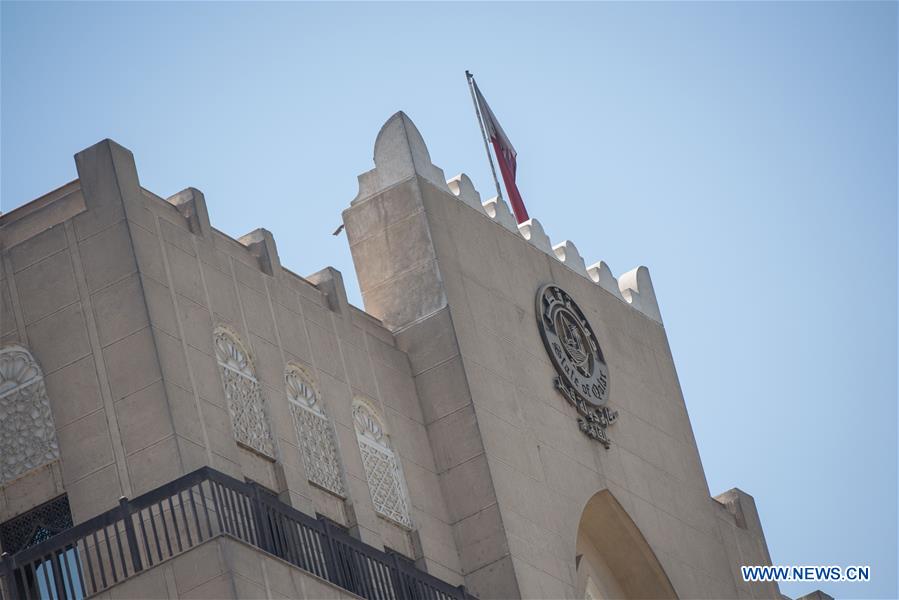
Photo taken on June 5, 2017 shows the Embassy of Qatar in Cairo, Egypt. Egypt announced on Monday the cut of diplomatic ties with Qatar, accusing the Gulf Arab state of supporting "terrorist" organizations, according to a Foreign Ministry statement. (Xinhua/Meng Tao)
BEIJING, June 14 (Xinhua) -- Since the announcement of severing diplomatic ties with Qatar, Saudi-led group of Arab countries have continued imposing pressure on the Gulf country, though signs of tension-relaxing have emerged.
Last Monday, Saudi Arabia and the United Arab Emirates (UAE), along with some other countries cut diplomatic ties with Qatar, accusing the Gulf state of supporting and financing "terrorism" as well as interfering in their internal affairs.
The diplomatic rift came just days after the Riyadh summit, where U.S. President Donald Trump called on the Sunni Arab nations to isolate Iran and ensured his Arab allies that Iran would "never have a nuclear bomb."
This diplomatic crisis marks a new low point within the Gulf Cooperation Council since 1992 when a shooting at the Saudi-Qatari border left two Qatari and one Saudi dead.
STRONG STANCE AGAINST QATAR
UAE Ambassador to the United States Yousef Al Otaiba said Tuesday that the United States should consider moving its air base out of Qatar and urged Donald Trump administration to use its leverage to further pressure Qatar.
However, he also told reporters in Washington that there was no military steps being taken by Arab powers against Qatar, which houses some 10,000 U.S. troops in a military base not far from Doha.
Asked about U.S. Secretary of State Rex Tillerson's call for the UAE and other Gulf countries to take de-escalation measures to ease the crisis, he said "That's not going to happen."
Tillerson and U.S. Defense Secretary Jim Mattis have been working the telephones attempting to de-escalate the crisis between the pan-Arab countries.
In Dubai, the UAE Minister of State said on Monday that the key solution to the ongoing diplomatic rift lies in Saudi Arabia.
The differences escalated earlier after Trump and Saudi King Salman Bin Abdulaziz pledged a united stance against Iran, accusing the Islamic Republic of sponsoring "terrorism" in Yemen, Lebanon and elsewhere in the Middle East.
On the other hand, the UAE's General Civil Aviation Authority said on Tuesday it was committed to its June 5 decision to ban all Qatari airlines and aircraft registered in Qatar from landing at state airports or crossing its sovereign airspace.
SIGNALS OF EASING TENSION
On Sunday, the UAE President Sheikh Khalifa Bin Zayed Al-Nahyan and Saudi King Salman Bin Abdulaziz Bin Saud both directed that lenience should be shown for Qatari-Emirati and Qatari-Saudi families on humanitarian grounds.
"Is it the beginning of reason and wisdom?" Anwar Mohammed Gargash, UAE Minister of State for Foreign Affairs, said on his Twitter account.
Also on Sunday, Kuwait said Qatar was ready to listen to the concerns of Gulf Arab states that have severed diplomatic and economic ties with it, Saudi daily Arab News reported. Kuwait has been exerting efforts to mediate the crisis between concerned sides.
The U.S. State Department said Tuesday that progress has been made towards resolving the crisis between Qatar and its Gulf neighbors after senior U.S. officials met leading players in the standoff.
"I would characterize the mood and the approach to that as being one that is hopeful, that believes that the worst is behind us," spokeswoman Heather Nauert told reporters.
"Let's keep in mind that everyone has agreed or these parties are working toward an agreement of combating terrorism, and that is the main focus," she said.
FOREIGN SUPPORT FOR QATAR
Amid tensions between Arab countries, several countries have firmly supported Qatar through different means.
Turkish President Recep Tayyip Erdogan on Monday criticized the sanctions imposed against Qatar, saying they were neither humanitarian nor Islamic, and urged Gulf and Arab countries to solve the crisis.
A three-member delegation from the Turkish Armed Forces (TSK) has visited Qatar since Monday for preparations for the deployment of a military base in the country, a move to support the Gulf oil-rich state.
Turkey, along with Morocco, have provided food to Qatar.
Iraqi Prime Minister Haider al-Abadi on Tuesday said Iraq rejects isolation of any state in the Gulf region, calling for cooperation to halt financing terrorism.
German Chancellor Angela Merkel said on Friday she was concerned about the situation in Qatar, adding that all Gulf nations, and also Iran and Turkey, should work together to find a solution to the regional dispute.
German Foreign Minister Sigmar Gabriel called on Friday for diplomatic efforts to resolve the crisis.
While the U.S. Department of State called the Arab powers to ease pressure on the Gulf state, U.S. President Donald Trump demanded that Qatar stop supporting terrorism. Enditem




